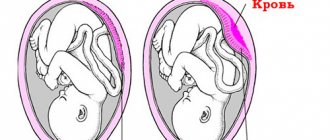Causes of low blood pressure during pregnancy
Low blood pressure during pregnancy may be the body's reaction to changes.
The causes of low blood pressure during pregnancy can be physiological and pathological. If physiological reasons are the body’s natural reaction to hormonal changes, then pathological ones can cause a lot of trouble. In any case, none of these reasons should be ignored, because this can negatively affect the pregnancy and pose a threat to the baby’s life.
A hormonal surge during pregnancy may be accompanied by low blood pressure. This condition occurs in most women, especially in short periods, against the background of toxicosis.
In the 2nd trimester, low blood pressure during pregnancy can be caused by inferior vena cava syndrome. In a woman lying on her back, the uterus is compressed, as a result of which the blood flow to the heart is disrupted. The expectant mother may experience a faint state at this moment. In this case, just turn on your side or sit on the edge of the bed, and you will feel that the pressure is normalized.
Low blood pressure during pregnancy in the 3rd trimester may have the same physiological reasons.
Most of the factors that cause a decrease in blood pressure are psycho-emotional in nature. These include:
- stress;
- nervous tension;
- overwork.
A sedentary lifestyle, poor diet, and being in a stuffy room also negatively affect blood pressure.
But sometimes hypotension during pregnancy is a sign of health problems for the mother and can pose a real threat to her unborn child.
Pathological causes of low blood pressure during pregnancy:
- stomach ulcer;
- infections;
- cardiovascular diseases;
- allergic conditions;
- adrenal insufficiency;
- problems with the thyroid gland.
Low diastolic (lower) pressure during pregnancy indicates that the woman has problems with blood vessels or the heart.
Why is low blood pressure dangerous during pregnancy?
Let's figure out why low blood pressure is dangerous during pregnancy:
- With arterial hypotension, blood circulates poorly to the placenta, which means the delivery of oxygen and beneficial microelements to the fetus slows down.
- Hypotension at any stage of pregnancy threatens the child with pathologies.
- Low blood pressure can cause termination of pregnancy or miscarriage.
- Hypotension can cause problems during labor. This is due to a violation of the contractile activity of the uterus. Childbirth may be accompanied by bleeding.
Low blood pressure during pregnancy in the 1st trimester may be due to toxicosis. Vomiting and nausea lead to dehydration, which, in turn, further reduces blood pressure. Against this background, gestosis can develop, which has an extremely negative effect on the well-being of the mother and the intrauterine development of the fetus.
If your blood pressure suddenly drops, you may faint and get injured. Falling on the stomach can harm the baby. A blow can provoke premature birth, the successful outcome of which is not guaranteed.
What pressure is considered low?
All people are advised to measure their blood pressure regularly, and not just when they feel unwell because it has risen or dropped to an uncomfortable level. This is necessary to know your individual norm and react quickly if the pressure is outside the normal range. This is especially true for pregnant women, since average pressure readings taken as the norm may not correspond to the real state of affairs, and well-being does not always accurately reflect the state of the cardiovascular system.
What blood pressure is considered normal? The norm is in the range of 110–140 mmHg. Art. for the upper indicator, and 60–90 mm Hg. Art. for the bottom. Thus, for one person the norm may be 110/60 mmHg. Art., and for another it will be considered excessively low pressure. Can blood pressure of 120/60 be low? Maybe if the individual norm is, for example, 130/80, although both numbers seem to correspond to normal values. This is why it is so important to know your normal.
A large number, upper or systolic pressure, characterizes the strength of cardiac output and may indirectly indicate cardiac pathology. The second number, the lower diastolic pressure, reflects the resistance of peripheral vessels and also depends on the functional state of the kidneys.
Associated symptoms
You can determine your blood pressure level using a tonometer. But there are a number of signs by which an expectant mother can determine that her blood pressure has dropped.
Symptoms of low blood pressure in pregnant women:
- attacks of nausea;
- general weakness;
- drowsiness;
- increased fatigue, decreased performance;
- headaches, dizziness;
- darkening of the eyes;
- noise in ears;
- feeling of lack of air, shortness of breath when walking;
- numbness of the upper and lower extremities;
- fainting.
Signs of low blood pressure in women during pregnancy can be either single or accompanying each other.
Is hospitalization necessary?
For a pregnant woman, hypertension is a dangerous phenomenon; in this case, hospitalization is necessary.
Important! If a woman’s hypertension began before the pregnancy was registered, the doctor issues a referral for hospitalization in the first trimester.
The degree of hypertension during pregnancy is determined in the hospital and possible complications affecting the woman’s health are determined. After this, it is necessary to select special treatment methods for the pregnant woman.
How to raise low blood pressure during pregnancy
Medications for hypotension can only be prescribed by the attending physician.
If low blood pressure is pathological, then treatment under the guidance of a doctor is necessary. Do not self-medicate under any circumstances and at the first signs of arterial hypotension, contact a medical facility.
Before determining what to do if a pregnant woman has low blood pressure, it is necessary to find out the nature of this condition. With the help of control blood pressure measurements, tests and a comprehensive examination, the doctor will tell you how to raise low blood pressure in pregnant women without risking her health or threatening the life of the unborn child.
In the treatment of hypotension in women bearing a child, both medications and folk remedies are used. But only a doctor can determine which of them are most optimal for you now.
Medications
When choosing medications, be guided, first of all, by the doctor’s prescription. Now there are a large number of drugs on the pharmaceutical market that pose minimal risk to a pregnant woman and her baby. Give preference to homeopathic medicines.
What to do for hypotension in pregnant women
Taking medications during pregnancy is not recommended by most experts. The pharmacological action of such drugs is aimed at narrowing blood vessels, which will negatively affect the blood supply to the placenta and can provoke an increase in uterine tone, increasing the threat of miscarriage or premature birth. Therefore, it will be necessary to regulate the indicators using lifestyle corrections, nutritional rules, and folk remedies approved by the doctor.
Non-drug methods
The safest way to increase blood pressure during early stages of pregnancy is to follow the following rules recommended by doctors regarding the lifestyle of the expectant mother:
- Balanced nutritious nutrition. A pregnant woman's diet should include more vegetables, fruits, fresh herbs, cereals, and be sure to eat protein foods - cottage cheese and fermented milk products, liver, butter, eggs. In the absence of edema, with the permission of your doctor, you can slightly increase your salt intake.
- Compliance with the recommended drinking regimen.
- Maintaining a daily routine. A full night's sleep (from 8 hours a day) and daily walks in the fresh air (to avoid oxygen deficiency and physical inactivity) are required.
- Perform regular physical activity as agreed with your doctor. Depending on the state of health and medical history, a woman can do special gymnastics for pregnant women, or engage in her favorite gentle sports - swimming in the pool, Norwegian walking, cycling, etc.
- A contrast shower perfectly improves vascular tone.
- With severe hypotension, a woman is not recommended to get out of bed suddenly after sleep.
- It is better to rest lying down on a high pillow. To prevent varicose veins and improve vascular tone, you should wear compression stockings, and after exercise or during attacks of nausea, lie on your back, raising your straight legs up (you can lean them against the wall).
Article on the topic: Codelac Neo - release form, composition, instructions for use, indications, side effects, analogues and price
In addition to the use of drugs that increase blood pressure during pregnancy, it is not recommended to resort to the following methods to lower blood pressure levels:
- Abuse tea and coffee. You don't need to completely give up caffeine-containing drinks, but you should limit your consumption to one cup per day.
- Self-medicate and take herbal stimulants without the permission and supervision of the pregnancy doctor.
- Abuse blood pressure-lowering foods (soybeans, honey, cranberries, pumpkin, almonds, citrus fruits, viburnum, beets).
Folk remedies
The use of traditional methods during pregnancy is possible only in consultation with a doctor. In the absence of individual contraindications, you can use one of the following remedies.
- Ginseng tincture. 15 drops, three times a day, for 14-20 days.
- Rhodiola rosea root tea. For 0.5 liters of boiling water, 0.5 tsp is required. chopped root. You can drink 200-250 ml per day, taking a break after a month of taking it for 2-3 weeks.
- Herbal decoction. St. John's wort (1 part), rose hips (2 parts), Rhodiola rosea root (2 parts). For 400 ml of boiling water, 1 tbsp is required. mixtures. The drink is infused for 1 hour, 100-150 ml are taken for 2-3 weeks.
Foods that increase blood pressure during pregnancy
If you have a tendency to hypotension, then the condition can be stabilized with the help of products that increase blood pressure during pregnancy:
- tomato juice;
- parsley;
- carrot;
- lemon;
- black currant;
- sea buckthorn;
- beef liver;
- eggs;
- butter;
- sturgeon caviar.
Drink sweet green tea with lemon in the morning. Add a teaspoon of honey instead of sugar. This beekeeping product has general strengthening and tonic properties, which is extremely useful in your condition.
Some say that pregnant women with low blood pressure can drink coffee. But these products can only harm you and your baby. During pregnancy with low blood pressure, you should not get carried away with coffee; it has diuretic properties. This list also includes caffeinated drinks and chocolate.
For more information about hypotension during pregnancy, watch the video:
Proper nutrition
If reduced vascular tone is not a consequence of a serious illness, it is raised to a normal level with proper nutrition.
The diet includes the following products:
- fresh and frozen berries;
- seasonal vegetables and fruits;
- protein products;
- beef liver;
- whole grains, bran;
- butter;
- white or green tea.
Cinnamon tones the body well. The daily spice requirement is a pinch. The diuretic spice soothes the digestive system and relieves headaches.
They eat fractionally, in small portions. According to indications, they take vitamin complexes, iron-containing preparations, and immunomodulatory agents.











